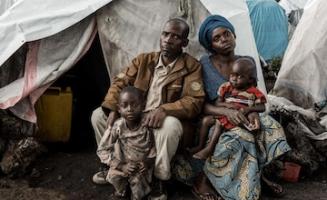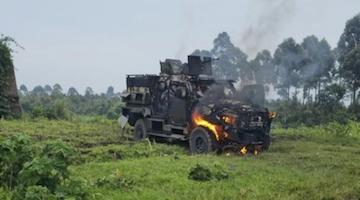Siddarth Kara’s book exposes the exploitation behind the Fourth Industrial Revolution.
“Unspeakable riches have brought the people of the Congo little other than unspeakable pain.” So writes Siddharth Kara in Cobalt Red, How the Blood of the Congo Powers Our Lives. It’s one of the many poetic phrases that make this book easy on the ear but hard on the heart and mind. There’s pleasure in turning the pages of such finely crafted prose, pain in knowing that, if you have half a heart, you’ll never be able to see your smartphone, laptop, tablet, solar power system, or electric car quite the same way again, that you’ll see blood all over the supply chain that put them in your hand, on your roof, or in your driveway. Despite such privilege, you might even ask yourself how you can stand to live in such an evil, brutally predatory world for one more day. I did, but I read on and highly recommend this book despite that shaky moment.
It’s better to know that, as Kara writes, “The ongoing exploitation of the poorest people of the Congo by the rich and powerful invades the purported moral foundation of contemporary civilization and drags humanity back to a time when the people of Africa were valued only by their replacement cost.”
Kara not only crafts a fine sentence, but also surrounds his subject—artisanal cobalt mining in the Democratic Republic of the Congo—with broad historical and economic context. He recounts the discovery of the Congo and the waves of exploitation and predation to claim its vast resource wealth, driven by successive technological revolutions, none of which have left anything for the Congolese people aside from comprador and kleptocratic elites.
He explains battery technology and the global dominance of battery manufacture by South Korean, Japanese, and, most of all, Chinese industrial titans. Huge Chinese corporations so dominate Congolese cobalt mining, processing and battery manufacture that one has to ask why a communist government, however capitalist in fact, doesn’t at least somehow require more responsible sourcing of minerals processed and then advanced along the supply chain within its borders. I hope that Kara’s book has or will be translated into Chinese.
That’s not to say that Kara even remotely exonerates the West. Equally predatory Western industrial titans sold cobalt mines to their Chinese counterparts, in one significant instance brokered by none other than Hunter Biden.
As Kara makes painfully clear, there’s blood all over the supply chain all over the globe, from the artisanal and industrial mines to the ore processors, battery manufacturers, and electronics manufacturers, including Apple, Google, Microsoft, Dell, Tesla, Ford, Huawei, Samsung, Motorola, and all the world’s other electronics giants and their retail outlets.
The one industry in that supply chain that he doesn’t mention is military manufacture, where Lockheed Martin, Boeing, Raytheon and all the rest rely on cobalt as much as the consumer electronics industries. That would complicate his argument with various national security concerns. His intended audience is, instead, the consumer electronics industries and electronics consumers themselves, whom he feels should demand that their products be ethically sourced.
Artisanal mining
“Artisanal” mining should not convey a pleasant image, as Kara writes:
“Today, these laborers are assigned the quaint term artisanal miners, and they toil in a shadowy substrate of the global mining industry called artisanal and small-scale mining (ASM). Do not be fooled by the word artisanal into thinking that ASM involves pleasant mining activities conducted by skilled artisans. Artisanal miners use rudimentary tools and work in hazardous conditions to extract dozens of minerals and precious stones in more than eighty countries across the global south. Because ASM is almost entirely informal, artisanal miners rarely have formal agreements for wages and working conditions. There are usually no avenues to seek assistance for injuries or redress for abuse. Artisanal miners are almost always paid paltry wages on a piece-rate basis and must assume all risks of injury, illness, or death.”
Thirty percent or more of Congolese cobalt mining is “artisanal”; the rest is industrial, conducted with heavy machinery. Congolese, whose environments have been destroyed to build vast industrial cobalt mines, have been left with no way to survive except by digging with picks and shovels or even their bare hands to gather bags of rocks that they might be paid as little as a dollar a day for.
They sell these bags of rocks to middlemen, “negociants,” who transport them on motorbikes or trucks to another type of middlemen in makeshift depots, or “comptoirs,” unless the miners work near enough to a depot to sell to it directly. Moving up the chain, the comptoirs sell to the industrial mines, and at that point, artisanally mined rock becomes indistinguishable from industrially mined rock. There’s no way to know which, or what admixture of the two, winds up in refineries, electronics manufacturing plants, retail stores, and consumers’ hands. “Accountability vanishes like morning mist in the Katangan hills as it travels through the opaque supply chains that connect stone to phone and car,” Kara writes.
Cobalt and climate ambitions
“In 2010,” Kara recounts, “there were only 17,000 electric vehicles on the road in the entire world. By 2021, that number had skyrocketed to 16 million. Meeting the ambitions of the Paris Agreement would require at least 100 million total electric vehicles in use by 2030. An even more ambitious EV30@30 Campaign was launched in 2017 with the goal of accelerating the deployment of electric vehicles, targeting a 30 percent market share for electric vehicles sales by 2030. The EV30@30 target would require a global stock of 230 million EVs by 2030, a fourteen-fold increase over 2021 numbers. EV sales could end up being even greater, as twenty-four nations pledged at COP26 to eliminate the sale of gas-powered vehicles entirely by 2040. Millions of tons of cobalt will be needed, which will continue to push hundreds of thousands of Congolese women, men, and children into hazardous pits and tunnels to help meet demand.”
Surely the lofty goal of saving the planet should be compatible with equitable sharing of the profits generated to create it, especially with the Congolese people, whose resources and labor are at its epicenter. Surely the environment of the Congolese should be included in concern for the environment as a whole, but that is not the world we live in. Kara’s book is not an explicit critique of capitalism, but it is an implicit one. It makes it clear that, without some form of socialism, a world powered by renewable energy will be no less predatory and no more people or community centered than that powered by fossil fuels.
Given the world’s finite supply of cobalt, battery engineers are already working on alternative designs that can minimize or eliminate reliance on it, and no matter how climate friendly, there’s no reason to believe that there’ll be any less blood on the supply chains required to manufacture them. Kara writes, “Even after battery designers find a way to eliminate cobalt from rechargeable batteries without sacrificing performance or safety, the misery of the Congolese people will not end. There will surely be another prize slumbering in the dirt that will be made valuable by the global economy. Such has been the curse of the Congo for generations.”
Critique of Cobalt Red
“Open Democracy” published a scathing critique of Cobalt Red which called it a sensationalistic, self-aggrandizing “White Saviour” exposé, even though Siddarth Kara is a South Asian Indian American. I spoke to Maurice Carney of Friends of the Congo (FOTC), and we agreed that whatever its failings, Cobalt Red has greatly expanded awareness of the human cost of electronics and clean energy manufacturing, most of all to the Congolese. He said that FOTC works with Congolese who like the book and are glad to see its wide reception. Kara has been interviewed on countless podcasts, on Democracy Now, and at the DC-based Foreign Policy Association. The book is a New York Times and Publishers Weekly bestseller, and it’s been shortlisted for the Financial Times Best Business Book of Year Award.
Ann Garrison is a Black Agenda Report Contributing Editor based in the San Francisco Bay Area. In 2014, she received the Victoire Ingabire Umuhoza Democracy and Peace Prize for her reporting on conflict in the African Great Lakes region. She can be reached at ann(at)anngarrison.com.



















